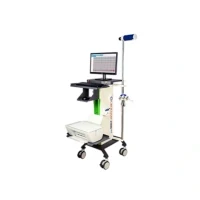
Status Medical UROCOMP 2000 Machine
The Medical UROCOMP is a medical device used for urological assessments
Key Features:
1. Urodynamic Testing:
- Purpose: The UROCOMP 2000 is designed for urodynamic studies, which assess how well the bladder and urethra are functioning. It helps diagnose conditions related to urinary incontinence, bladder dysfunction, and other urological disorders.
2. Comprehensive Testing:
- Parameters: It typically measures various parameters such as bladder pressure, flow rates, and detrusor pressure. This allows for a thorough evaluation of bladder function and the urinary tract.
3. User Interface:
- Display and Controls: The machine generally features a user-friendly interface with a digital display that provides real-time data and results. It may include touch-screen controls for easy navigation and data entry.
4. Data Management:
- Recording and Storage: The UROCOMP 2000 often includes capabilities for recording and storing test results. This data can be analyzed and reviewed later, and may also be integrated with electronic health record (EHR) systems for better patient management.
5. Testing Modes:
- Dynamic Testing: The device usually supports various urodynamic testing modes, including filling cystometry, pressure-flow studies, and electromyography (EMG) of the pelvic floor muscles.
6. Sensors and Probes:
- Equipment: It typically comes with a range of sensors and probes, including bladder catheters and flow meters, designed to accurately measure and record relevant urodynamic parameters.
7. Software:
- Analysis Tools: The accompanying software often includes tools for detailed analysis, including graphical representations of data, calculation of urodynamic parameters, and automated report generation.
8. Calibration and Maintenance:
- Accuracy: The machine usually includes features for calibration to ensure accurate measurements. Regular maintenance and calibration are necessary to maintain performance and reliability.
Applications:
- Urological Diagnostics: Used for diagnosing conditions such as urinary incontinence, bladder outlet obstruction, and other disorders of the urinary tract.
- Pre-Surgical Assessment: Helps in evaluating bladder function before certain urological surgeries.
- Follow-up Studies: Useful for monitoring the effectiveness of treatments and interventions.
Advantages:
- Accurate Testing: Provides detailed and accurate measurements of urodynamic parameters, aiding in precise diagnosis.
- Comprehensive Data: Offers a range of testing modes and parameters for a thorough evaluation of urological conditions.
- User-Friendly Interface: Designed for ease of use, with intuitive controls and data management features.
